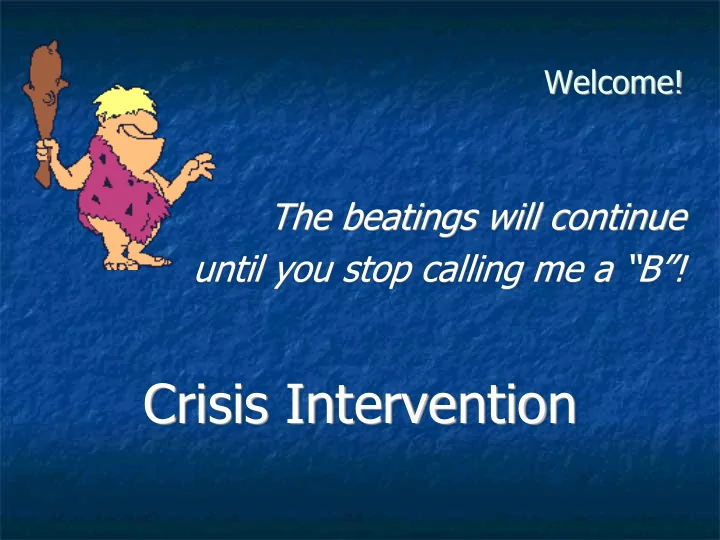

Welcome! The beatings will continue until you stop calling me a “B”! Crisis Intervention
Some Random Thoughts Concerning Crisis Some days you are the bug; some days you are the wind shield. Never test the depth of the water with both feet. If you find yourself in a hole...stop digging. Timing has a lot to do with the outcome of a rain dance. Do not corner something that you know is meaner than you. Life is a lot simpler when you plow around the stump.
Just A Few More Be smarter than what you are dealing with. Never miss a good chance to shut up. Just remember that you are unique. Just like everyone else. Everyone seems normal until you get to know them. There are two theories concerning arguing with females.....neither one works.
Preventing a Crisis Never ever take a sleeping pill AND a laxative before going to bed!
Story of Robert How he changed my whole philosophy of discipline...
Prevention is Always Best Timing is essential in effectively managing a crisis situation. “Teachable Moments” Both teachers and students should develop specific pro-action strategies relative to creating a safe environment. Need to “pre - teach” then practice.
Assess Student's Approachability Will they communicate with you? Are they violent? Do they show some self-control? Will they follow a simple request? Do you believe they would be receptive to the “Counseling Method”?
The Four-Step Counseling Model Step 1: “SAY WHAT YOU HEAR OR SEE” Focus on the body language - show them you are paying attention to them Purpose-To let the student know they have your attention in a non-judgemental way.
Step 2: “ESTABLISH THE FEELING” Seems to me like you’re ______? Purpose-To connect a feeling to the behavior in an effort to establish a base or understanding for further communication.
Step 3: “CONNECT THE FEELING TO A SOURCE” Who, What, Where, When and How Avoid the “WHY” Purpose- To connect the feeling to the source or sources of distress.
Step 4: “PLAN OF ACTION” What do you want? What have you tried? What else can you do? Purpose-to assist the person in crisis towards establishing a plan of action of getting their needs met in acceptable and safe ways.
If They Are Beyond the Counseling Model And are almost stepping off the dock...
John Magg: Powerful Struggles “Resistance is often created when we fail to recognize the world view from which the student is operating and fail to modify our behavior accordingly.”
Things to AVOID
Avoid Power Struggles Human emotions can “tip the scale” in a crisis situation. Present yourself as an ally and assess your body language. Get in your CAR (calm, aware, respectful) before, during, and after crisis situations.
Power Struggles Power struggles result when children are given “win - lose” scenarios, i.e. “I win; you lose.” Don’t give “traction”. What they are use to getting.
Negative Communication The human brain automatically ignores the negative word: “stop, no, don’t.”
Example of Negative Communication Do not think of a pink toad! Do not think of a pink toad! Do not picture in your mind a PINK TOAD! Do not think of a pink toad! Do not think of a pink toad! NO PINK TOAD !
A Few Others to Avoid Being Judgmental Avoid “dismissing” the problem or student feeling Avoid advice or “quick fixes” Do not use threats Don't use a question format – Why did you.
Response Guidelines for Oppositional / Defiant Behaviors Non-emotional instead of emotional requests - Don’t take it personal. Approach with an “empathy statement” Descriptive and direct requests Keep a safe distance
Response Guidelines for Oppositional / Defiant Behaviors No more than two requests Check tone of voice Give time to comply More start requests than stop requests Reinforce Minimal Compliance Actively listen Defuse situation at onset
Guidelines For Effective Crisis Communication Get in your CAR! (calm, aware, respectful) Create a one-on-one (minimize distractions). Timing is everything (be pro-active). Set behavioral limits-make them clear, simple and enforceable Explain the why. Professionalism-Don't lose control
When Everything Else Has Failed
Questions Or comments
Recommend
More recommend